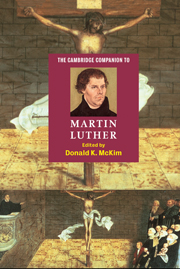Book contents
- Frontmatter
- Part I Luther’s life and context
- Part II Luther’s work
- 3 Luther’s writings
- 4 Luther as Bible translator
- 5 Luther as an interpreter of Holy Scripture
- 6 Luther’s theology
- 7 Luther’s moral theology
- 8 Luther as preacher of the Word of God
- 9 Luther’s spiritual journey
- 10 Luther’s struggle with social-ethical issues
- 11 Luther’s political encounters
- 12 Luther’s polemical controversies
- Part III After Luther
- Part IV Luther today
- Select bibliography
- Index
6 - Luther’s theology
from Part II - Luther’s work
Published online by Cambridge University Press: 28 May 2006
- Frontmatter
- Part I Luther’s life and context
- Part II Luther’s work
- 3 Luther’s writings
- 4 Luther as Bible translator
- 5 Luther as an interpreter of Holy Scripture
- 6 Luther’s theology
- 7 Luther’s moral theology
- 8 Luther as preacher of the Word of God
- 9 Luther’s spiritual journey
- 10 Luther’s struggle with social-ethical issues
- 11 Luther’s political encounters
- 12 Luther’s polemical controversies
- Part III After Luther
- Part IV Luther today
- Select bibliography
- Index
Summary
INTRODUCTION
With Martin Luther a parting of the ways is inevitable. To some he was a religious genius or German hero, others saw in him the destroyer of the Western church and with it the associated inseparable unity of empire and nation. Curiously enough there is no firm historical verification of Luther's self-understanding that could possibly be condensed into one characteristic keyword - despite a multitude of self-statements and a deep reflection on his own thoughts and actions going far beyond the usual measure. Luther pictures himself in various positions and taking on many different tasks. Thus the programmatic change of his name already reveals a fundamental insight behind it: Luder - in late medieval High German bearing the connotation of such words as “dirt” and “garbage” - is changed into eleutherius or Luther - “the liberated and at the same time Christ's servant and prisoner.” This gives us a hint of his future insight – extensively formulated in a style of paradox later on – into God’s justifying action and the resulting knowledge of the complete inability of humans to act independently in accord with a requisite obedience to God and love for one’s neighbor. At the same time Luther stresses over and over again his dignity and position as a Master of Holy Scripture, which to him embodied the ultimate authority and therefore also served him as the unquestionable basis for any theological argument.
- Type
- Chapter
- Information
- The Cambridge Companion to Martin Luther , pp. 86 - 119Publisher: Cambridge University PressPrint publication year: 2003
- 4
- Cited by



